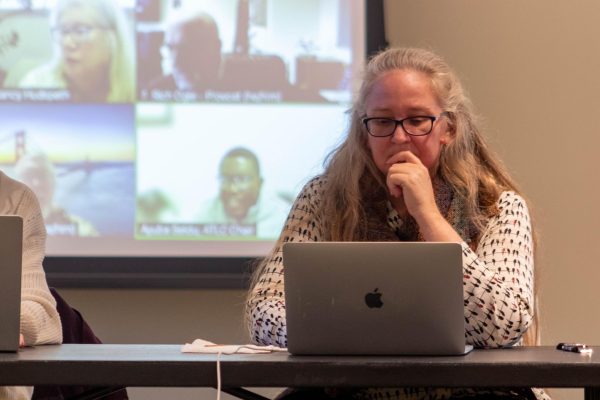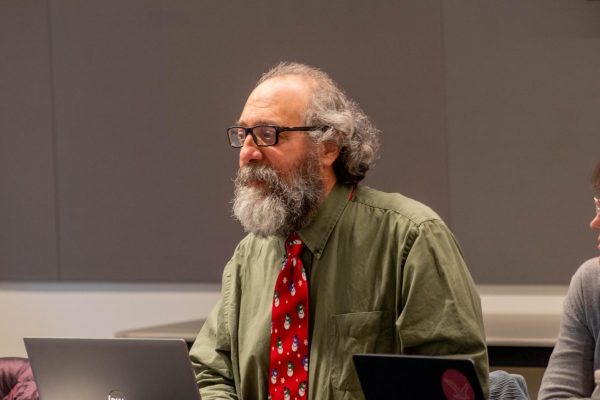In yesterday’s Academic Senate session, the Senate held two vital votes—one to send back a resolution to committee for revision that would have established a new course requirement for all students to earn a Bachelor’s at CSU Stanislaus and another to oppose the recent budget cutting measures, the cutting of courses and raising of class sizes among them, and denounce them as undermining the mission of the university.
Faculty Argue Over Implementation of New Requirement to Fill Gap Left by New Systemwide General Education Policy
Effective in Fall 2025, Cal-GETC is a new, uniform general education pathway that will be implemented across the CSU.
This new pathway eliminates Area E from its general education requirements and reduces the numbers of required units in Area C by three.
Area E is described as “Lifelong Learning and Self-Development” and features courses focused around either healthy living and wellness or that prepare students for the expectations and culture of the university.
Area C is the Arts and Humanities requirement, and its reduction by three units means that many students will no longer be required to take a music, language, theatre, art, or literature course during their academic career.
The resolution brought to the Senate floor yesterday by UEPC and its chair, Senator Mechelle Perea-Ryan, was intended to implement a new requirement local to Stan State which would ask all undergraduate students to complete at least one unit of a university-preparation course, an arts course or a language course in order to graduate.
Senator Perea-Ryan, as the presenter and supporter of this resolution, recommended that individual departments add more electives to their roadmaps and increase the breadth of their curricula.
She reasons this is only one of numerous measures that should be taken to ensure a liberal education for all university students.
“If we truly believe in the value of liberal education, we must be willing to adapt creatively to protect what we offer our students,” Perea-Ryan said.

Some Senators, however, argued that any requirement of this type that the Senate passes and implements should have a strong emphasis on the importance of the humanities and not look like, as Senator Keith Nainby referred to it, a “vocational model of education.”
Senator Nainby, as part of a longer statement, voiced the opinion of himself and his cohorts in opposition to the resolution of how this requirement should be revised.
“We recommend sending the proposal back to UEPC to consider two separate requirements,” he said. “First, a Student Success Skills requirement with a minimum of two units, which could include languages, for example. And second, an Arts and Humanities or Arts and Culture requirement with a minimum of three units. Doing this would ensure that we would maintain the current balance of units between humanities, sciences and social sciences.”
Senator Nainby then moved a vote to return the resolution back to the UEPC for revision. This vote passed with a majority, with 29 in favor, 6 against, and 6 abstaining.
Faculty Denounces Administration’s Recent Budget Cuts as “Eroding the Core Mission of the University”
Yesterday’s Academic Senate also saw tensions run high between faculty and administration over administration’s recent austerity measures, which include increasing course caps, cutting upper division specialty courses from the curriculum, and offering fewer sections of the same course.
These cuts have led to unexpected loss of work for lecturers, and also adds a burdensome workload on faculty who are being asked to instruct larger class sizes.
As such, the SEC brought forward a resolution to condemn these recent budget cutting measures and demanding that the Stan State administration reverse these measures and find a different course of action to reduce spending.
The resolution states that, if these measures are not reversed, faculty will go public with their complaints and issue official statements with “local community leaders, including the mayors of Turlock, Modesto, and Stockton, State Legislators who represent our service area, the leadership of the California Legislature, and the Governor’s Office.”
CFA Chapter President Dave Colnic, during his committee report yesterday, spoke on the budget issues that Stan State is facing and stated his opinion that reports from the administration are not painting the full picture.
“Our budget is increasing, it has been increasing for the last several years, it increased this past year,” he said. “That is state funding, 5% a year.”

He also stated that communications from the administration have implied that the budget situation is the responsibility of faculty, staff and managers who have received raises and other gains in their contracts. He says that these administrators often admit to taking significant raises themselves.
What Colnic is most concerned about, however, is how this will affect instructors and their ability to work.
“On our campus and throughout the system because of this austerity, faculty have already lost jobs,” he said. “Some campuses have received layoff notices, on other campuses simply faculty were not rehired. I will concede, some of this is due, particularly on some campuses that have been very hard hit by enrollment decline. Some of this might be, it was simply a loss in demand. I will not concede that that’s the case on our campus.”
Senator Al Petrosky moved to waive the rules of the Senate to take this resolution directly to a second reading, which was seconded by Senator Colnic. This waiving of the rules went to a vote, which passed.
In their second reading discussion, Provost Rich Ogle intervened with the administration’s perspective on the budget issue. While acknowledging the importance of student success and the contributions of faculty, staff and coaches to that success, he asked the Senate to consider the “very stark and difficult reality.”
“We currently sit, this year alone, with a 13.6 million dollar shortfall,” the Provost said. “That simply means we are 13.6 million dollars short of paying our bills. 22 of the 23 campuses are engaging in cuts… I have significant concerns calling these unnecessary, I wouldn’t be doing them if they were unnecessary.”
The resolution to condemn these austerity measures then moved to a vote, where it passed with 35 in favor and two abstaining.










